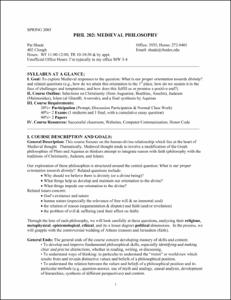Please use this identifier to cite or link to this item:
http://hdl.handle.net/10267/3494Full metadata record
| DC Field | Value | Language |
|---|---|---|
| dc.contributor.author | Shade, Patrick A. | - |
| dc.date.accessioned | 2009-02-26T17:10:36Z | - |
| dc.date.available | 2009-02-26T17:10:36Z | - |
| dc.date.issued | 2005-01-12 | - |
| dc.identifier.uri | http://hdl.handle.net/10267/3494 | - |
| dc.description | This syllabus was submitted to the Rhodes College Office of Academic Affairs by the course instructor. | en_US |
| dc.description.abstract | General Description: This course focuses on the human-divine relationship which lies at the heart of Medieval thought. Thematically, Medieval thought tends to involve a modification of the Greek philosophies of Plato and Aquinas as thinkers attempt to integrate reason with faith (philosophy with the traditions of Christianity, Judaism, and Islam). Our exploration of these philosophies is structured around the central question: What is our proper orientation towards divinity? Related questions include: • Why should we believe there is divinity (or a divine being)? • What things help us develop and maintain our orientation to the divine? • What things impede our orientation to the divine? Related issues concern: • God’s existence and nature • human nature (especially the relevance of free will & an immortal soul) • the relation of reason (argumentation & dispute) and faith (and/or revelation) • the problem of evil & suffering (and their effect on faith) Through the lens of each philosophy, we will look carefully at these questions, analyzing their religious, metaphysical, epistemological, ethical, and (to a lesser degree) political dimensions. In the process, we will grapple with the controversial wedding of Athens (reason) and Jerusalem (faith). General Ends: The general ends of the course concern developing mastery of skills and content: • To develop and improve fundamental philosophical skills, especially identifying and making clear and precise distinctions, whether in reading, writing, or discussing. • To understand ways of thinking: in particular to understand the “vision” or worldview which results from and reveals distinctive values and beliefs of a philosophical position. • To understand the relation between the values and beliefs of a philosophical position and its particular methods (e.g., question-answer, use of myth and analogy, causal analysis, development of hierarchies, synthesis of different perspectives) and content. | en_US |
| dc.language.iso | en_US | en_US |
| dc.publisher | Memphis, Tenn. : Rhodes College | en_US |
| dc.relation.ispartofseries | Syllabi CRN | en_US |
| dc.rights | Rhodes College owns the rights to the archival digital images in this repository. Images are made available for educational use only and may not be used for any non-educational or commercial purpose. Approved educational uses include private research and scholarship, teaching, and student projects. For additional information please contact archives@rhodes.edu. Fees may apply. | - |
| dc.subject | Philosophy, Department of | en_US |
| dc.subject | Syllabus | en_US |
| dc.subject | Curriculum | en_US |
| dc.subject | Academic departments | en_US |
| dc.subject | Text | en_US |
| dc.subject | 2005 Spring | en_US |
| dc.title | PHIL 202-01, Medieval Philosophy, Spring 2005 | en_US |
| dc.type | Syllabus | en_US |
| Appears in Collections: | Course Syllabi | |
Files in This Item:
| File | Description | Size | Format | |
|---|---|---|---|---|
| 2005_sp_PHIL_202-01.pdf | 172.71 kB | Adobe PDF |  View/Open |
Items in DSpace are protected by copyright, with all rights reserved, unless otherwise indicated.